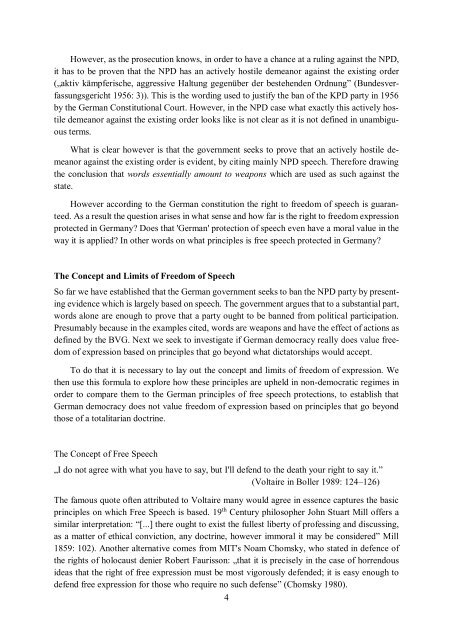SFP 1-1
Erfolgreiche ePaper selbst erstellen
Machen Sie aus Ihren PDF Publikationen ein blätterbares Flipbook mit unserer einzigartigen Google optimierten e-Paper Software.
However, as the prosecution knows, in order to have a chance at a ruling against the NPD,<br />
it has to be proven that the NPD has an actively hostile demeanor against the existing order<br />
(„aktiv kämpferische, aggressive Haltung gegenüber der bestehenden Ordnung” (Bundesverfassungsgericht<br />
1956: 3)). This is the wording used to justify the ban of the KPD party in 1956<br />
by the German Constitutional Court. However, in the NPD case what exactly this actively hostile<br />
demeanor against the existing order looks like is not clear as it is not defined in unambiguous<br />
terms.<br />
What is clear however is that the government seeks to prove that an actively hostile demeanor<br />
against the existing order is evident, by citing mainly NPD speech. Therefore drawing<br />
the conclusion that words essentially amount to weapons which are used as such against the<br />
state.<br />
However according to the German constitution the right to freedom of speech is guaranteed.<br />
As a result the question arises in what sense and how far is the right to freedom expression<br />
protected in Germany? Does that 'German' protection of speech even have a moral value in the<br />
way it is applied? In other words on what principles is free speech protected in Germany?<br />
The Concept and Limits of Freedom of Speech<br />
So far we have established that the German government seeks to ban the NPD party by presenting<br />
evidence which is largely based on speech. The government argues that to a substantial part,<br />
words alone are enough to prove that a party ought to be banned from political participation.<br />
Presumably because in the examples cited, words are weapons and have the effect of actions as<br />
defined by the BVG. Next we seek to investigate if German democracy really does value freedom<br />
of expression based on principles that go beyond what dictatorships would accept.<br />
To do that it is necessary to lay out the concept and limits of freedom of expression. We<br />
then use this formula to explore how these principles are upheld in non-democratic regimes in<br />
order to compare them to the German principles of free speech protections, to establish that<br />
German democracy does not value freedom of expression based on principles that go beyond<br />
those of a totalitarian doctrine.<br />
The Concept of Free Speech<br />
„I do not agree with what you have to say, but I'll defend to the death your right to say it.”<br />
(Voltaire in Boller 1989: 124–126)<br />
The famous quote often attributed to Voltaire many would agree in essence captures the basic<br />
principles on which Free Speech is based. 19 th Century philosopher John Stuart Mill offers a<br />
similar interpretation: “[...] there ought to exist the fullest liberty of professing and discussing,<br />
as a matter of ethical conviction, any doctrine, however immoral it may be considered” Mill<br />
1859: 102). Another alternative comes from MIT's Noam Chomsky, who stated in defence of<br />
the rights of holocaust denier Robert Faurisson: „that it is precisely in the case of horrendous<br />
ideas that the right of free expression must be most vigorously defended; it is easy enough to<br />
defend free expression for those who require no such defense” (Chomsky 1980).<br />
4



